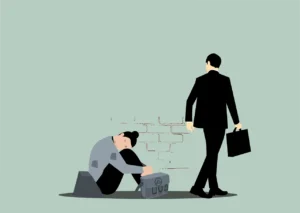What happens if you have defaulted your mortgage terms?
So first of all, if a homeowner is in default or has a problem with their mortgage, they can’t pay up or they’ve got they’ve broken some term in their conditions of their mortgage that the banks are happy with, then the bank usually send them a letter and they normally try to come up with some sort of arrangement or a payment arrangement for years or miss payment.
But if they find that you’re regularly missing payments or the default or built up of arrears for more than let’s just say a couple of months, they are likely to be in contact with you to try and come up with an arrangement, but if they can’t, they will actually instruct a court hearing, or they would send you a letter actually saying that there’s going to be a court hearing and then you’d have to attend court.
What would typically happen is you would end up going to court and if the court votes against you or says that you need to pay a certain amount, even if you may have lost your job or have experienced other forms of hardship, you’ll still need to find a certain amount from somewhere. Then they may come up with a payment plan for two years, which you need to make sure that you pay all the rears up, but they would do something called they would act against you as something called suspended possession order. Suspended possession order is very bit draconian.
If you miss any single payment, then they’ve got the ability to repossess your property anytime. So that’s actually a little known fact that suspended possession orders aren’t really understood. So that’s something quite interesting for you guys to note. The other thing that’s important is that when it comes to repossession, we have by tolerate properties by to let properties are quite different by to let properties.
What happens if you don’t make an arrangement for repayment?
If you do go into arrears or go into default or build up of miss payments, then what the bank will do is the law is very different. Then something called the law of property act 1925in so they can technically appoint receiver straight away and take control of the keys and the rent off that property. And similarly, for commercial property can be pretty much the same process, so they can change the locks, they can collect the rent. And they’ve also got the power of sale of the property as well. So that tells you a little bit about the different types of repossession. If you need assistance please call us!
So just to reiterate, I’m going to talk about the different types of scenarios that you can get with the residential homes now as well. So if you’ve got a residential house, you could actually get banks being a bit aggressive. Some banks are quite aggressive, like Northern Rock and Kensington, sometimes Kent Alliance. And if you get into arrears or the end of a loan period, they’re quite different things.
So repossessions actually occur for different reasons. So first of all, you can go into arrears which we’ve discussed, but if you come to the end of your loan, your income may not be the same. You may not be able to refinance or from an age point of view, you may not be able to be able to refinance out, so you may have lost your job or your income. Multiples may not work for a residential property for all those reasons. Typical reasons as to why the banks actually take a stance of taking you to court.
Okay, so next scenario is by tonight we’re going to go into a bit more detail, which are the type of banks that may actually get a bit aggressive with you. So the first bank that may get a bit aggressive is Mortgage Express. Second bank is a company called CHL, and typically they tend to get aggressive again for similar reasons as to a residential property, but with a vitality if it’s gone into rears or you’ve come to an end of loan or you’ve broken the terms and conditions of that. Sorry.
So again, inability to refinance in this current state, you’ve got a lot of landlords. We’ve got tenants who haven’t actually paid them their rental dues, so that’s actually creating a bottleneck or there’s a lot of loss on jobs, et cetera, which is also an issue.
The end of loan term is actually quite common issue with a lot of vital properties as well as another. No one says some landlords have actually decided to go live in one of their buy tolerate properties, but they haven’t declared it to the mortgage lender because no, the reasons is typically they tend to get a cheaper rate. Typically they get a cheaper rate if you’re residential, but if they’re going back into the house and living in it without permission, they’ve broken the terms and conditions of the bank’s terms.
So that’s another reason that a bank could get aggressive or want to appoint receivers. So let’s see. So those are some of the basic introduction as to what happens with the repossession and by select properties. Let’s see what the next. So I’ve got a couple of case studies that I can go through, so we’ll do it in a minute
So the truth behind why the banks want you to lose your property. Myths and facts about Repossession so basically everything in the mortgage terms has been written in favor of the lender banks so we can offer 15 years of loan advice on how to tackle that. Unfair.






162 responses
fb account for sale account selling service website for buying accounts
I don’t think the title of your article matches the content lol. Just kidding, mainly because I had some doubts after reading the article.